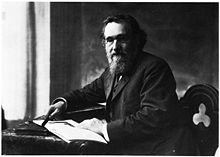Phagocytosis theory
The phagocytosis theory (also phagocyte theory ) states that scavenger cells ( phagocytes ) play a central role in the fight against infectious diseases in the organism.
The last two decades of the 19th century were marked by the conflicts between the protagonists of cellular and humoral immunity . The zoologist Elias Metschnikoff (1845–1916) observed, in continuation of his investigations into intracellular digestion in coelenterates , that carmine- colored bodies introduced into echinoderms ( starfish ) accumulate in mesoderm cells (1882, 1883). He linked this observation with the question of whether the mobile cells “also protect the organism in its fight against harmful intruders”. In an experiment with the rose thorn pricked into a starfish , the mobile cells gathered around the thorn, and thus, as Metschnikoff writes, the foundation for his theory of phagocytosis was laid. Metschnikoff assumed that the bacterial inflammation was a healing process in the body, a defense mechanism in which the bacteria were "eaten up" by the cells migrating to the infection site. Virchow (1885) accepted this theory, which coincided with his ideas on cellular pathology. One of the forerunners of the theory of phagocytosis was J. Muellendorf, who, like others before him, had seen in 1879 that the pathogens causing relapsing fever ( Borrelia ) are absorbed by white blood cells. The experiments were continued in higher animals, and the phagocyte theory was supported by Louis Pasteur and John Lister , but judged very cautiously by Robert Koch . In a work from 1887 Metschnikoff differentiated between two types of phagocytes, the macrophages and the microphages, according to today's terms of macrophages and polymorphonuclear granulocytes . The school of phagocyte theory was opposed to the idea of humoral immunity , which was mainly represented by the German side .
literature
- I. Jahn: history of biology, theories, methods, institutions, short bibliographies . 3. Edition. Gustav Fischer, Jena 1998, ISBN 3-437-35010-2 .
- Elias Metschnikow: Embryological studies on insects . Published by Wilhelm Engelmann, Leipzig 1866. PDF
- Metchnikoff, E .: Immunity to Infective Disease . Cambridge University Press, Cambridge, London, New York 1905.
- Paul de Kruif : Elias Metschnikow. The good phagocytes. In: Paul de Kruif: Microbe hunters. (Original edition: Microbe Hunters. Harcourt Brace & Co., New York 1926) Orell Füssli Verlag, Zurich / Leipzig 1927 a. ö., pp. 198-223.
